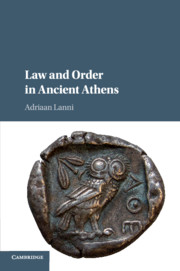Conclusion
Published online by Cambridge University Press: 05 August 2016
Summary
Several years ago I argued that the Athenian courts did an excellent job of resolving disputes fairly and quickly, not despite, but because of the absence of procedural and evidentiary rules. What I have tried to show here is that these same courts did not merely resolve disputes, but also played an important role in shaping and enforcing norms. Ironically, the aspects of the Athenian legal system that seem to us the most removed from a “rule of law” may actually have been the most effective in fostering order and compliance with norms. The citation of laws other than the specific law under which the case was brought may have helped foster order through the law's expressive function. For example, the frequent references to hubris in court cases, including discussion of the protection of slaves under the law, may have had a symbolic effect even though cases under the hubris statute were rare, and even though there may have been no hubris cases brought on behalf of slaves. We have also seen that the use of character evidence, including descriptions of an opponent's bad behavior in completely unrelated situations, may have helped foster order by boosting deterrence and compensating for underenforcement in a regime that depended on private initiative. Moreover, the lack of strict legal rules and the jurors’ ad hoc approach toward decision making made it easier for litigants to advocate for changes in the law and for jurors to accommodate shifting norms, thereby bringing the law into line with current community sentiment. And the loose approach to evidence allowed the Athenians to accomplish transitional justice goals within the framework of the ordinary popular courts.
In describing each of the non-Austinian mechanisms for maintaining order in Athens, I have drawn insights from modern legal sociology as a jumping-off point, adapted to the Athenian context and complicated through thick historical description. In some respects, the sociological models appear to be more applicable to Athens than to contemporary legal systems: the unusual publicity surrounding and frequency of Athenian trials make it much more plausible that discussion of unrelated norms in court served a disciplinary role, that statutes would have an expressive effect, and that court arguments and verdicts would play a strong role in shaping norms.
- Type
- Chapter
- Information
- Law and Order in Ancient Athens , pp. 200 - 204Publisher: Cambridge University PressPrint publication year: 2016



